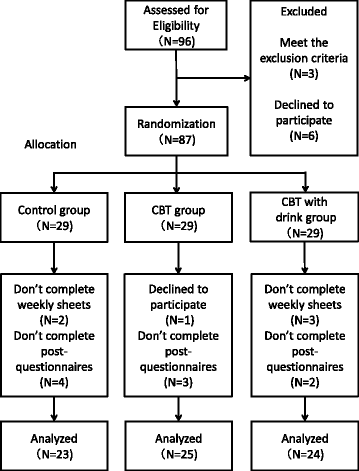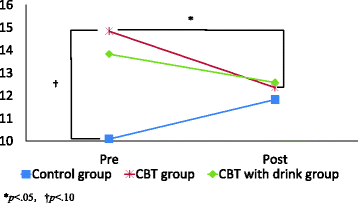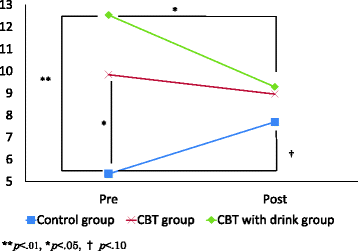The effect for Japanese workers of a self-help computerized cognitive behaviour therapy program with a supplement soft drink
- PMID: 28932258
- PMCID: PMC5604512
- DOI: 10.1186/s13030-017-0109-5
The effect for Japanese workers of a self-help computerized cognitive behaviour therapy program with a supplement soft drink
Abstract
Background: Computerized cognitive behaviour therapy (CCBT) programs can provide a useful self-help approach to the treatment of psychological problems. Previous studies have shown that CCBT has moderate effects on depression, insomnia, and anxiety. The present study investigated whether a supplement drink that includes L-carnosine enhances the effect of CCBT on psychological well-being.
Methods: Eighty-seven participants were randomly allocated to a control group, CCBT, or CCBT with supplement drink. The CCBT and CCBT with supplement drink groups received six weekly self-help CCBT program instalments, which consisted of psycho-education about stress management and coping, behaviour activation, and cognitive restructuring. The CCBT group consumed a bottle of the supplement soft drink every morning through the 6 weeks. This program was delivered by an e-learning system on demand and also included a self-help guidebook. Seventy-two participants completed the program or were assess at the end of the study.
Results: ANOVA revealed that there were significant interactions (times × groups) for POMS tension-anxiety and fatigue. The CCBT group showed significantly improved tension-anxiety scores, whereas the CCBT with drink group showed significant improvements on fatigue.
Conclusion: The self-help CCBT program reduced the subjective experience of tension-anxiety in this group of workers. The addition of a supplement drink enhanced the effect of CCBT on fatigue, providing one possible approach to enhancement of such programs.
Trial registration: This study was registered on September 2, 2016 at UMIN. The registration number is UMIN000023903.
Keywords: Computerized cognitive behaviour therapy; L-carnosine; Self-help; Workplace.
Conflict of interest statement
Ethics approval and consent to participate
This study was approved by the Institutional Review Board of Suntory Ltd. (ID: MMI-14-01). An informed consent session in which the purpose and procedures of the study were explained was held before the start of the program, and the participants provided written informed consent.
Consent for publication
Not applicable.
Competing interests
YN and KA were employees of Suntory Global Innovation Center Limited during the study period.
Publisher’s Note
Springer Nature remains neutral with regard to jurisdictional claims in published maps and institutional affiliations.
Figures



Similar articles
-
Brief internet-based cognitive behavior therapy program with a supplement drink improved anxiety and somatic symptoms in Japanese workers.Biopsychosoc Med. 2017 Sep 1;11:25. doi: 10.1186/s13030-017-0111-y. eCollection 2017. Biopsychosoc Med. 2017. PMID: 28874913 Free PMC article.
-
L-carnosine as an enhancer to computerized cognitive behaviour therapy in Japanese workers, an unjustified claim.Biopsychosoc Med. 2018 Sep 4;12:11. doi: 10.1186/s13030-018-0130-3. eCollection 2018. Biopsychosoc Med. 2018. PMID: 30202430 Free PMC article.
-
Does Computerized Cognitive Behavioral Therapy Help People with Inflammatory Bowel Disease? A Randomized Controlled Trial.Inflamm Bowel Dis. 2016 Jan;22(1):171-81. doi: 10.1097/MIB.0000000000000567. Inflamm Bowel Dis. 2016. PMID: 26360545 Clinical Trial.
-
Computerized cognitive behaviour therapy for depression in people with a chronic physical illness.Br J Health Psychol. 2013 Nov;18(4):729-44. doi: 10.1111/bjhp.12014. Epub 2012 Dec 12. Br J Health Psychol. 2013. PMID: 23237622 Review.
-
Short-Term Effects of a Multidimensional Stress Prevention Program on Quality of Life, Well-Being and Psychological Resources. A Randomized Controlled Trial.Front Psychiatry. 2019 Mar 12;10:88. doi: 10.3389/fpsyt.2019.00088. eCollection 2019. Front Psychiatry. 2019. PMID: 30914974 Free PMC article. Review.
Cited by
-
Trends in Effectiveness of Organizational eHealth Interventions in Addressing Employee Mental Health: Systematic Review and Meta-analysis.J Med Internet Res. 2022 Sep 27;24(9):e37776. doi: 10.2196/37776. J Med Internet Res. 2022. PMID: 36166285 Free PMC article.
-
Carnosine/histidine-containing dipeptide supplementation improves depression and quality of life: systematic review and meta-analysis of randomized controlled trials.Nutr Rev. 2025 Feb 1;83(2):e54-e64. doi: 10.1093/nutrit/nuae021. Nutr Rev. 2025. PMID: 38545720 Free PMC article.
-
The Potential of Carnosine in Brain-Related Disorders: A Comprehensive Review of Current Evidence.Nutrients. 2019 May 28;11(6):1196. doi: 10.3390/nu11061196. Nutrients. 2019. PMID: 31141890 Free PMC article. Review.
-
Exploring the Role of Persuasive Design in Unguided Internet-Delivered Cognitive Behavioral Therapy for Depression and Anxiety Among Adults: Systematic Review, Meta-analysis, and Meta-regression.J Med Internet Res. 2021 Apr 29;23(4):e26939. doi: 10.2196/26939. J Med Internet Res. 2021. PMID: 33913811 Free PMC article.
-
Unveiling the Hidden Therapeutic Potential of Carnosine, a Molecule with a Multimodal Mechanism of Action: A Position Paper.Molecules. 2022 May 20;27(10):3303. doi: 10.3390/molecules27103303. Molecules. 2022. PMID: 35630780 Free PMC article. Review.
References
LinkOut - more resources
Full Text Sources
Other Literature Sources

